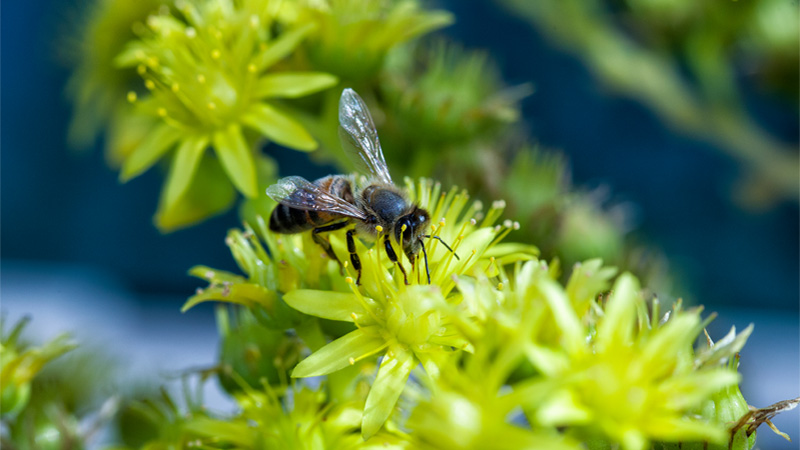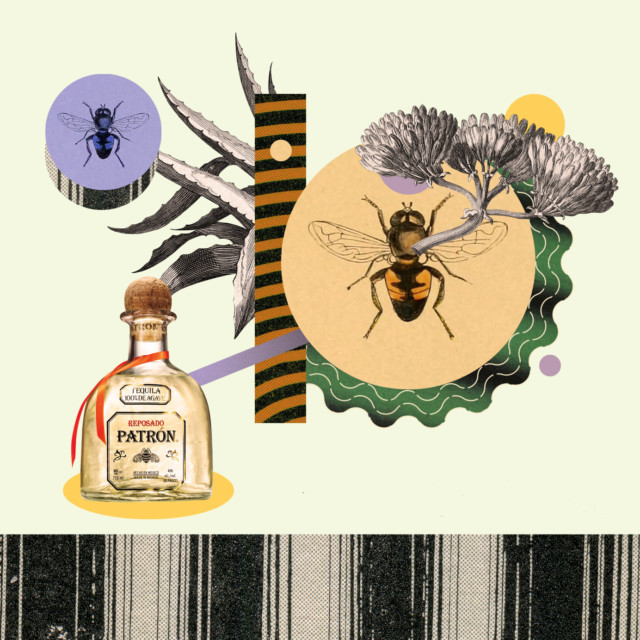
This article is part of a series, highlighting the importance of additive-free and authentic tequila, partnered by PATRÓN. Discover more at The World of PATRÓN.
“Pollination, pollination – it’s good for the bees and good for the nation.” I picked up this clever adage from my fourth-grade science teacher. Though my first lesson on bee pollination was over two decades ago, it’s now a permanent fixture in my brain. So, what’s all the buzz behind bees and pollination?
Pollination is important because it leads to the production of the fruits we eat and tequila we drink. Moreover, since agave plants are integral to the tequila-making process, they rely on this vital process of pollination. As you’ve surmised from my catchy grade school rhyme, pollination is good for every living thing on this planet. So, what exactly is pollination? It’s the transfer of pollen grains from one flower to another. Many creatures help move pollen between flowers and act as “pollinators,” such as bees and lesser long-nosed bats.
As tequila increased in popularity over the past few decades, demand has essentially surpassed the pace of supply. To counteract, industrial agave farming has largely replaced traditional farming methods though, unfortunately, at the expense of agave plants and their pollinators. Bottom line: Without a continual supply of agave, there wouldn’t be tequila. And what many consumers don’t realize is just how pivotal of a role bees and bats play in the tequila-making process.
In the case of agave, when the bee visits a plant, it is looking for food, but while feeding, these insects accidentally transfer pollen grains between agave and help the plants produce seeds. Then, voila! Another agave is planted. The cultivation of plants, especially agave, is dependent on bees and bats. Since bees play a particularly crucial role in agave pollination, revered tequila-makers PATRÓN have committed to developing flavorful tequila that is mindful of all aspects of the agave-producing process, including bee pollination.

PATRÓN has been limiting the environmental impact of its tequila production and today is celebrated as the largest purveyor of premium, additive-free tequila. Now, the company is proactively funding a study with a top agricultural research center in Mexico to ensure the sustainability of the Weber Blue Agave plant for the entire industry. It also creates more than 5,500 tons of fertilizer compost a year from leftover agave fibers at the Hacienda PATRÓN distillery. Furthermore, PATRÓN takes in used agave fibers, free of charge, from ten other neighboring distilleries.
The sustainable harvesting of agave encourages farmers to selectively harvest agave plants, leaving some to reproduce. Technically, cultivated agaves don’t need pollination since most are grown from small offsets of a mother plant. Research and policy analyst of FoodPrint, Ryan Nebeker writes, “These offsets are technically clones, and while this ensures a field of plants that all have the same characteristics which will produce an even and predictable product, the technique comes at the cost of genetic diversity.” Moreover, when bats and bees are permitted to pollinate plants, genes combine in distinctive ways and multiple beneficial traits arise, such as disease resistance or drought tolerance. Nebeker continues, “Large, genetically identical fields are potentially vulnerable to being wiped out all at once by pests or disease. This has already happened in the past: a wave of fungal infections in the mid-1990s swept through cloned blue agave fields and sent prices skyrocketing.”
Since they’re so intertwined, any disruption to the pollinators can gravely impact the entire agave industry. Wild plants are important to tequila makers, and cultivated agaves ultimately come from wild sources, so bee and bat pollination is one of the agave industry’s sole sources of genetic diversity. Thus, harvesting immature agaves in the field and overharvesting immature wild agaves short-circuits the agave industry’s survival since the pollinators lose their main foundation of food. While other companies might cut production time by using premature agave in their formula, PATRÓN does not.
When you keep the pollinators happy (here’s to you bees and bats), the agave plants flourish. And when the agave thrives, we can imbibe on a steady flow of delicious tequila-based cocktails thanks to sustainable farming and pollination –– a move that’s certainly good for the bees –– and good for the nation.
This article is sponsored by PATRÓN.

